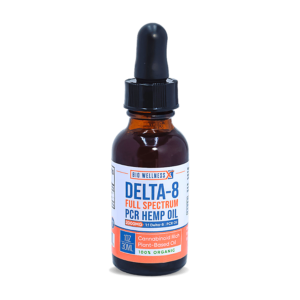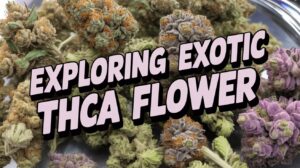You’ve probably heard the buzz about Delta-8 THC and CBD, two powerful compounds that have taken the wellness world by storm. If you’re like many others, you may wonder which is better for your needs and how they differ. Look no further! In this article, we’ll dive deep into the fascinating world of these hemp-derived powerhouses and explore the unique properties, benefits, and applications of Delta-8 vs. CBD. So, kick back, relax, and delve into the exciting world of Delta-8 vs. CBD: what’s the difference, and which is better?
Main Key Points
- CBD’s non-psychoactive nature offers a calming relief without any mind-altering experiences.
- When you convert CBD to Delta-8 requires refluxing CBD in an organic solvent.
- Both Delta-8 THC and CBD interact with the ECS system differently.
- Delta-8 THC offers potent analgesic effects, providing relief from deep-seated pain caused by injury or illness.
What is Hemp-Derived Delta-8 THC?
You might be wondering how hemp-derived Delta-8 THC works its magic. It’s a unique compound that interacts with your body’s endocannabinoid system. From there, it binds to CB1 and CB2 receptors in the brain and nervous system. This results in effects similar to traditional Delta 9 THC but less intense.
Imagine experiencing the benefits of cannabis without any overwhelming effects or adverse events. Today that’s possible with the innovative and groundbreaking potential Delta-8 offers. It distinguishes itself from CBD, which doesn’t produce any intoxicating effects.
How Does It Work?
When comparing Delta-8 to CBD, it’s essential to understand that both are derived from the cannabis plant but have different properties. Delta-8 THC is a psychoactive compound that binds to receptors in your brain, producing effects such as relaxation, euphoria, and increased appetite. D8 doesn’t give you those negative effects that regular THC products can give you.
On the other hand, CBD is non-psychoactive and interacts with various receptors throughout your body to potentially offer numerous health benefits without altering your mental State and no memory loss.
The endocannabinoid system (ECS) is crucial in understanding how Delta-8 THC and CBD work within our bodies. This complex cell-signaling system helps maintain balance and regulate mood, sleep, appetite, and immune response.
Both Delta-8 THC and CBD interact with this system differently. Delta-8 primarily binds to CB1 receptors found in the brain, leading to its psychoactive effects, while CBD has a more indirect approach—binding with several receptors throughout the ECS—promoting potential benefits such as reduced inflammation and stress relief.
Ultimately, discovering which of these remarkable compounds suits you best depends on personal preference and desired outcomes. Whether you’re seeking a euphoric high, uplifting experience, or holistic wellness support, there’s no denying that Delta-8 THC and CBD can help foster a sense of belonging within the ever-evolving cannabis community!
What is CBD?
CBD, or cannabidiol, is a natural compound found in the Cannabis Sativa plant, primarily in the hemp variety. It is one of the many cannabinoids present in the plant, with THC (tetrahydrocannabinol) being the most well-known. CBD is non-psychoactive, meaning it does not produce the “high” associated with THC. It has gained popularity for its potential therapeutic benefits, which may include relief from pain, inflammation, anxiety, and other medical conditions.
How Does CBD Work in the Human Body?
CBD may be your go-to option if you desire an innovative approach toward holistic wellness accompanied by feelings of relaxation and tranquility without intoxication. It has garnered immense popularity among passionate individuals who believe in its potential therapeutic benefits, such as anti-inflammatory properties, anxiety relief, and neuroprotective effects.
Simply put, CBD still reacts with the ECS, but in a different way. It only reacts with the CB1 receptor and has little-to-no effect on the CB2 receptor. This allows the body to utilize all the same cannabis benefits with no psychoactive THC effects.
However, if you seek a more visionary experience combining gentle stimulation with calming effects while still maintaining control over your mental faculties, Delta-8 could be just what you’ve been searching for!
As part of an emerging movement embracing alternative paths to well-being and personal growth, choosing either of these compounds puts you at the forefront of a vibrant community seeking deeper connections with themselves and others through plant-based solutions.
So, explore new ways to enhance your life by experimenting with Delta vs. CBD – who knows where this journey will take you?
What’s the Difference Between Delta-8 THC and CBD?
Diving into the world of cannabis compounds, you might wonder how two popular cannabinoids, Delta-8 THC and CBD, stack up against each other. While both get derived from the Cannabis sativa plant, they have unique properties that set them apart from each other and other cannabinoids.
Delta-8 THC is a psychoactive compound found in small amounts in hemp plants. Conversely, CBD (or cannabidiol) is a non-intoxicating cannabinoid known for its therapeutic effects.
To help clarify the differences between these two fascinating compounds, let’s take a look at this table.
| Delta-8 THC | CBD |
|---|---|
| Psychoactive | Non-intoxicating |
| Found in small amounts in hemp plants | Abundant in hemp plants |
| Known for uplifting and energizing effects | Known for relaxing and calming effects |
| Requires conversion from delta-9 THC or CBD to produce larger quantities | Easily extracted from hemp plants directly |
| Provides mild euphoria and enhances sensory experiences | Reduces inflammation, anxiety, and pain without causing high |
As you can see, Delta-8 vs. CBD holds significant differences in their effects on your body and mind. Delta-8 THC offers an uplifting experience with mild euphoria while still allowing you to maintain focus and control. Unlike THC, CBD is ideal for those seeking relaxation without any psychoactive impact. No matter which one you choose to explore, both cannabinoids offer valuable benefits depending on your needs or preferences.
By understanding these distinctions within the vast world of cannabis compounds, you can find your unique path to wellness while gaining a sense of belonging among enthusiasts who appreciate this remarkable plant’s complexities.
Is CBD or Delta-8 THC Better for Pain Relief?
When it pertains to pain relief, you may wonder if CBD or Delta-8 THC is the more practical option for your needs.
The truth is that both of these cannabis-derived products have their unique benefits. Additionally, both can work together to provide a powerful solution for chronic pain sufferers.
CBD is well known for its anti-inflammatory properties, making it an excellent choice for those dealing with conditions like arthritis and muscle soreness. Low to moderate doses of CBD may also be better for daytime use if you want to stay awake and avoid drowsiness.
Unlike CBD, Delta-8 THC has been found to offer potent analgesic effects, providing relief from deep-seated pain caused by injury or illness. In general, Delta-8 may have more short-term benefits due to its psychoactive and euphoric qualities. To find the best fit for you, experiment with different CBD and Delta-8 THC ratios in your daily routine.
Embrace this innovative approach to pain management and unlock a new level of comfort and well-being that’ll make you feel truly alive!
Which One is Better for Anti-Inflammation?
Ready to tackle that pesky inflammation and regain control of your life? Let’s explore the potential benefits of CBD and Delta-8 THC for inflammation relief.
Both compounds are found in hemp products, but there’s a world of difference between Delta-8 vs. CBD when it comes to their anti-inflammatory properties. As part of the ever-evolving world of cannabis research, scientists are discovering new ways these compounds can help with various medical conditions, including those related to inflammation.
CBD, or cannabidiol, is known for its potent anti-inflammatory effects without any psychoactive side effects. Full-spectrum CBD oil has a wider range of cannabinoids that work together synergistically to enhance its therapeutic potential. Just be aware that full-spectrum CBD oil does contain traces of Delta-9 THC and may show up on a drug test. Broad-spectrum CBD oil has all the same benefits, with no detectable THC.
On the other hand, Delta-8 THC also has some anti-inflammatory properties, as it is derived from the same cannabis plant as CBD.
Whichever option you choose, embracing these innovative cannabis products can invite a sense of belonging among like-minded individuals who share your passion for finding natural solutions to health concerns! So if you are looking more for a euphoric experience, you might want to go with Delta-8 THC.
Is Delta-8 or CBD Better for Sleep?
Let’s move ahead to how Delta-8 and CBD can each improve your sleep quality.
CBD and Delta-8 THC offer unique benefits that cater to different needs, but it’s very important to understand the differences before choosing which one is right for you.
When considering which option will best help you achieve deep, restful sleep, remember your personal preferences and safety concerns. If you’re searching for something that offers relaxation and sedation without any intoxicating effects, consuming CBD might be for you. On the other hand, if you’re seeking a full experience with mild euphoric effects that could help lull you into slumber, give Delta-8 a try. When it comes to which one is better at inducing sleep, it seems Delta-8 is our winner. This is simply due to its natural ability to relax and de-stress users, similar to indica Delta-9 THC strains.
However, be aware of any potential side effects or legal restrictions in your area when using these products.
Ultimately, finding the perfect solution for improving your sleep quality may require some experimentation – but once you discover what works best for you, it’ll all be worth it as you drift off into dreamland feeling rejuvenated and connected to your inner self.
Potential Side Effects of Delta-8 Products
You might be wondering about the potential side effects of using Delta-8 THC products. As a potent cannabinoid derived from the cannabis plant, Delta-8 is gaining popularity for its unique effects. Although it has similarities to CBD, some key differences make it stand out.
One significant difference is that Delta-8 can cause psychoactive effects similar to THC. On the other hand, CBD has no intoxicating properties. This means that when you use Delta-8 THC products, you may experience a range of physical and mental sensations. Some users report feeling relaxed and euphoric, while others describe more intense feelings of focus or creativity.
With this psychoactivity comes risk, however. Delta-8 can cause dizziness, dry mouth, drowsiness, and mild paranoia. It’s important to note that users report feeling less intense and less severe side effects compared to Delta-9 THC.
If anything, these adverse effects serve as a reminder to think about new experiences with an open mind and a willingness to experiment responsibly. After all, isn’t living life passionately all about embracing change and seeking better ways of achieving balance?
So go ahead – give Delta-8 THC a try and see how it compares to CBD for yourself!
Potential Side Effects of CBD Products
Now that we’ve looked into Delta-8, let’s switch gears and explore the potential side effects of CBD products.
While CBD has gained immense popularity for its therapeutic benefits, it’s important to understand that, as with anything, there may be some potential side effects.
The good news is that these adverse effects are relatively mild compared to those associated with traditional Delta-9 THC and even the less psychoactive Delta-8 THC products.
Hemp-derived CBD products have been widely embraced by many who seek relief from various ailments without the risk of becoming intoxicated.
CBD’s most commonly reported side effects include dizziness, fatigue, dry mouth, and changes in appetite or weight. Though with low THC amounts, it’s likely users won’t experience these adverse effects in normal CBD doses.
Although these symptoms can be inconvenient, they’re generally considered tolerable when weighed against CBD’s myriad health benefits.
Moreover, research on CBD continues to grow exponentially – revealing more about this fascinating compound and its incredible ability to help people live healthier lives.
So if you’re seeking a natural way to manage anxiety or pain without compromising your mental clarity or overall well-being – look no further than high-quality hemp-derived CBD products!
We can embrace this revolutionary plant-based solution and create a brighter future for everyone.
Benefits of Combining CBD with Delta-8 THC
Imagine experiencing the best of both worlds! Combining CBD with Delta-8 THC can offer unique synergistic effects that elevate your well-being to new heights. The benefits of combining these two potent cannabinoids lie in their molecular structure. It allows them to work together for more potent effects than if used individually.
By mixing CBD with the popular cannabinoid Delta-8 THC, you’ll be able to enjoy a sense of calming relaxation while still maintaining mental clarity and focus. Most, if not all, Delta-8 THC products on the market today are typically manufactured from hemp-derived CBD.
| Benefit | CBD | Delta-8 THC |
|---|---|---|
| Anxiety Relief | ✓ | ✓ |
| Pain Management | ✓ | ✓ |
| Sleep | ✓ | ✓ |
| Mental Clarity & Focus | × | ✓ |
| Euphoria | × | ✓ |
By combining these cannabinoids, you’ll experience a greater range of therapeutic effects and satisfy medicinal needs. Embrace this visionary approach to holistic wellness by exploring the world of combined CBD and Delta-8 THC products today!
What Are the Best Delta-8 Products with CBD?
It’s time to elevate your wellness journey by discovering the top-notch Delta-8 products infused with CBD designed to enhance your life and make you feel truly alive! As you continue exploring the differences between Delta 8 and CBD, uncovering the best products is vital to this thrilling adventure.
Our Delta-8 tincture with full-spectrum PCR Oil is a powerful blend that combines the benefits of Delta-8 THC and full-spectrum PCR Oil. This addition of PCR, an ultra-potent form of CBD, is done to create a clean and effective formula for optimal health.
BioWellnessX uses the nation’s best hemp and advanced technique to keep THC and CBD distillates clean, effective, and Farm Bill compliant. You can check out their entire cannabis inventory HERE!
Final Thoughts: Delta-8 THC vs. CBD
It’s time to embrace the future of cannabinoid wellness and discover the perfect balance between Delta-8 THC and CBD for your unique needs.
Don’t settle for anything less than a synergistic blend that amplifies both compounds’ benefits, providing unparalleled relief, relaxation, and rejuvenation. Combining Delta-8 THC and CBD triggers something called “the entourage effect”, which elevates the effects and experience of both compounds.
So go ahead, and explore the world of Delta-8 and CBD – then try combining the two!
It’s an innovative, passionate journey that awaits you – one that could redefine your approach to health and well-being forever.
Thanks for reading!

Legal Disclaimer:
By reading this information presented, you agree to release the author of any liability that comes from using this data. This post does not constitute legal advice. Claims about cannabinoids have not yet been approved by the food and drug administration FDA. Read the full legal disclaimer here.
Other articles that might have your interest:
- Delta-8 vs. Delta-10 For Pain: Which Works The Best?
- What Is The Difference Between Delta-9 THC And Delta-8 THC?
- Mixing Delta-9 with alcohol
- Delta 8 THC For Sleep: Does It Really Work?
- Delta-8 THC Near Me: Best Places To Buy Delta-8 Products!
- Is Delta-8 THC Addictive? A Comprehensive Analysis.
- CBD Gummies Without Delta-9 THC.
References:
- Farm Bill- Hemp Production and the 2018 Farm Bill – 07/25/2019 | FDA
- Controlled Substances Act- The Controlled Substances Act
- Poison Control Centers- U.S. poison centers see rise in case reports related to CBD
- Clinicians’ Guide to Cannabidiol and Hemp Oils
- Therapeutic Efficacy of Cannabidiol (CBD)
- Consumer Experiences with Delta-8-THC
- Delta-8-THC: Delta-9-THC’s nicer younger sibling?
FAQs About Delta-8 THC vs. CBD
It’s a common misconception that Delta-8 THC products are illegal. In actuality, thanks to the US farm bill, it’s considered federally legal! However, some states expressly prohibit it. You should always talk to a doctor and check your State laws before trying THC and CBD products.
Delta-8 and Delta-9 THC will appear on drug tests even in low doses. It’s enough to test positive, but CBD isolate will not appear on the test.
No, no, no! We recommend that you do not buy your hemp-derived products from gas stations or convenience stores. Their products are not regulated, and you will never know what chemical compound or by-products are in them.
CBD from hemp plants containing no more than 0.3% THC is legal at the federal level. CBD derived from psychoactive cannabis (sometimes called a “marijuana-derived strain”) is not legal according to federal law.









